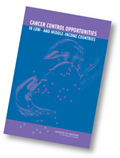
Cancer Control Opportunities in the Developing World
On February 4, World Cancer Day, the Institute of Medicine (IOM) of the National Academies released a new report, "Cancer Control Opportunities in Low- and Middle-Income Countries." The report states that the causes of and outcomes for cancer in developing countries are different from conditions within more affluent, developed countries, and notes that a "one-size-fits-all" solution for cancer control in the developing world is impractical. Instead, IOM recommends a number of unique, resource-appropriate strategies to control and combat cancer.
 The report, sponsored by NCI's Office of International Affairs (OIA) and the American Cancer Society, was developed to address the fact that cancer already represents a significant disease burden in low- and middle-income countries. The report focuses on the opportunities in these countries to improve cancer prevention, surveillance, treatment, and palliative care.
The report, sponsored by NCI's Office of International Affairs (OIA) and the American Cancer Society, was developed to address the fact that cancer already represents a significant disease burden in low- and middle-income countries. The report focuses on the opportunities in these countries to improve cancer prevention, surveillance, treatment, and palliative care.
"It's very clear that cancer will become an increasingly heavy burden on low- and middle-income countries," noted Dr. Joe Harford, OIA director. "Now is the time to begin in earnest to prepare and to address what can be done in these venues."
One example of the distinct differences in the causes of cancer, IOM notes, is that 26 percent of cancers in developing nations can be attributed to infectious agents such as Helicobacter pylori, hepatitis B and C viruses, and human papillomaviruses (HPV), compared with only about 8 percent in the developed world. Developing countries also have low cure rates and high death rates from cancer, due largely to the advanced stage of disease at diagnosis typical in countries with poor health care infrastructures.
The report discusses issues related to the feasibility of implementing cancer control interventions when resources are limited. For example, an approach that is effective in the United States or Europe may not work in low- and middle-income countries. The report states that priorities for cancer control, and the accompanying cost-benefit analyses, need to be developed in the context of each nation. IOM points to the Breast Health Global Initiative, which is also supported by NCI, as a paradigm for developing resource-level-appropriate guidelines for the overall management of other major cancers.
The IOM report contains several recommendations. First among these is that every developing nation create a cancer control plan. It also recommends that each country sign, ratify, and implement the Framework Convention on Tobacco Control of the World Health Organization. In the area of infectious causes of cancer, the report recommends the continued assistance of the GAVI Alliance and others in incorporating vaccination for hepatitis B virus into childhood immunization programs. Developing countries are also urged to plan for the introduction of vaccination against HPV to reduce the incidence of cervical cancer.
 |
 |
Featured Meetings and Events |
 |
|
A calendar of scientific meetings and events sponsored by the National Institutes of Health (NIH) is available at http://calendar.nih.gov.
|
|
Given the usually late stage of diagnosis and initiation of treatment for cancer in low- and middle-income countries, IOM stresses the need for enhanced palliative care. The report urges governments to work with national organizations to identify and remove barriers that affect the availability of medications for pain relief and management of other symptoms of advanced cancer.
Cancer surveillance and monitoring are important in gauging the magnitude of the burdens of different cancers and in assessing the efficacy of cancer-control and other interventions. The IOM authors recommend that risk-factor surveillance be initiated, with collection of cause-specific mortality data a priority.
"The IOM report clearly sets forth the issues and makes specific recommendations," commented Dr. Harford. "It should be required reading for all who are interested in the global fight against cancer." |